This is a guest post by Sahil Kakkar.
27% of the global online population performs voice searches on mobile. And the volume is nearly 1 billion per month.
That’s not going to slow down anytime soon and will likely become more widespread.
Hence, optimizing your content for voice searches has become increasingly important.
In this article, we’ll cover:
- Why do people perform voice searches?
- What are the characteristics of voice searches?
- How to optimize your content for voice searches
Let’s dive in.
Why Do People Perform Voice Searches?
Smartphones, speakers, home assistants, etc. have become common household items.
Only 10% of people are unfamiliar with voice-enabled devices. But why do people prefer voice searches over typed searches?
There are three reasons:
- Multitasking Ability: While driving, you can do a voice search to know if a particular store is open or not.
- Instant Answers: You can find out the time or temperature by a simple voice search.
- Speeds-up Processes: You can call a person instantly with the help of a voice search.
In short, voice search has become a part of people’s daily routine. 20% of smart speakers and smartphone owners use voice searches several times per day.
That’s because they offer a more human relationship with technology. 41% of people feel that it’s like talking to a friend (while doing voice searches). For example, you say ‘thank you’ and the assistant replies ‘you’re welcome’.
Besides this, voice searches also ease out the lives of physically disabled people. For example, a blind person can use a voice assistant to call someone or to read an email.
All in all, the global population is benefitting from voice searches. So, they are adapting and using it more frequently.
How To Optimize Your Content For Voice Searches?
71% of consumers prefer using voice search to search for something online.
So, it becomes necessary to optimize your website and your profiles for such queries.
Here are a few actionable tips to start optimizing:
1. Create Content Answering Questions
People mostly use questions when doing voice searches.
So, if you are trying to rank for voice search queries, create content that answers the most common questions in your industry.
You can easily find the common questions by searching for the most relevant question keyword for your site.
There’s a good chance that you’ll find a ‘People Also Ask’ section in the search results. It shows you the questions your target audience is regularly asking.
Just pick up those questions and start answering them with your content. Solve people’s problems and clear their doubts. List out the steps they can follow to accomplish a task.
Just make sure you provide valuable answers and a good user experience. If you can do this, you have an excellent chance of ranking for voice searches.
2. Make It Conversational
We all do voice searches in our natural language.
For example, we would say, ‘What is the recipe for white sauce pasta?’ If we were to type this, the search query would have been ‘white sauce paste recipe.’
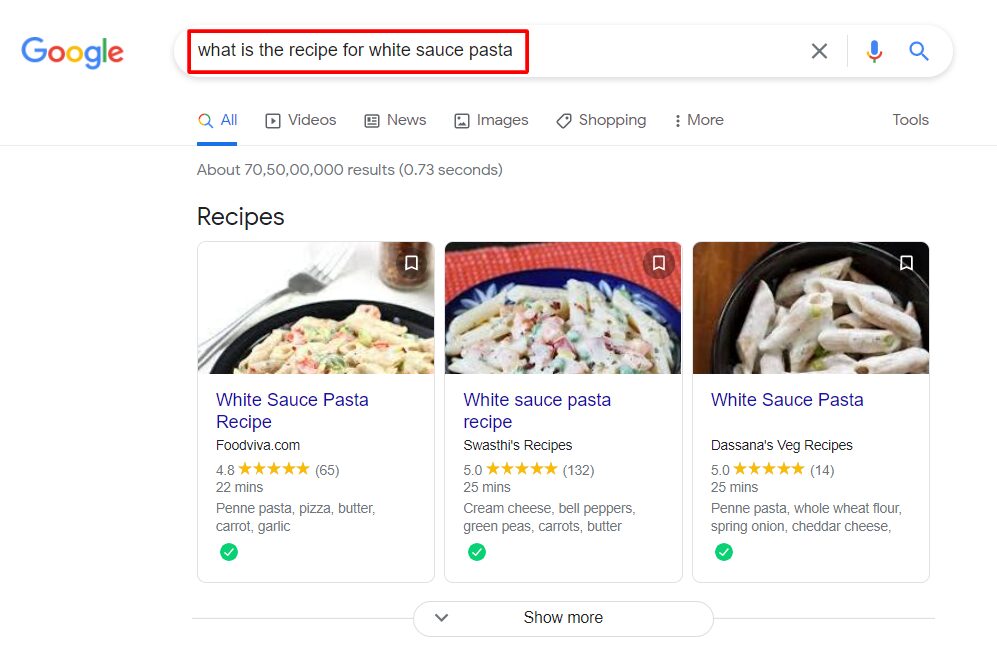
So, to optimize your content for voice search, you have to use language naturally. When people search through voice, they tend to talk and use spoken language.
If you keep this point in mind and write your content, it will be easier to rank for voice search queries.
Do not stuff keywords in your content to please the crawler. Instead, make it conversational by adding phrases we use daily to ask for them.
For example, you have defined zero-click search in your article.
For voice searches, you can use ‘what is zero-click search’ or ‘what is the meaning of zero-click searches’ in your article. You can go for other variations as well.
Provide information by matching the language people use in voice searches. The content that answers queries in the best way will perform well in search results.
3. Break Up Content Into Small Parts
Voice searches usually return single-word answers. Or, perhaps, one-line replies.
For example, your voice search query is, ‘Who is the author of Harry Potter?’. The typical result would be ‘J.K. Rowling.’

Similarly, if you do a voice search asking, ‘What is January?’, the result would be ‘the first month of the year, coming after December.‘
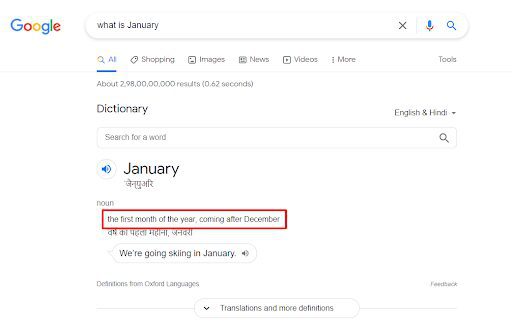
The results are short and relevant. So, your content should be easily scannable for the crawlers.
You can divide the long-form articles into parts and keep each part concise and to the point.
Use simple sentences, short paragraphs, and clear subheadings to break up your content as much as possible.
If you make your content clear and valuable, your content will be optimized for voice searches.
4. Focus on Long Tail Keywords
Voice searches are significantly longer than typed searches.
That’s because people tend to speak faster than typing on a keyboard or mobile device.
So, think about the kind of questions that might bring people to your site and use long-tail keywords associated with it in your content.
The exact keyword doesn’t need to appear in the title or meta description. You can use it in your content body, wherever it is appropriate.
Google will pull an answer from a long page for a voice search query, even if it forms a small part of the content.
Just keep it natural, concise, and appropriate while embedding lots of long-tail keywords in it.
You can rank for multiple voice search queries with a single piece of content when you do so.
5. Pump Up Your Structured Data
A majority of voice search answers come from featured snippets.
For example, you do a voice search asking, ‘what is the full form of PPC.’ Google will read out the following definition to you:

If you look at the search results, you will find that the response was fetched from a featured snippet.
Similarly, if you ask your voice assistant, ‘what is IBM.’ It would read the information in the knowledge panel for you.

While other search results would appear on desktop and mobile devices, the case is not the same for voice-enabled devices.
Google Home or Alexa Echo voice search queries return only one result. And it is mostly from featured snippets or knowledge panels.
So, to optimize your content for overall voice searches, it becomes more important to pump up your site’s structured data.
Use markups (if possible) to help search bots understand your page’s content. If you make it easy for them, they’ll make it easy for you to rank for voice search queries.
Now, let’s look at a few advanced tips. If you are ‘all-in’ for optimizing content for voice search, you’ll love these.
6. Add FAQs at the End
FAQs are ideal for voice search queries.
As mentioned earlier, question keywords dominate voice searches. And people usually want quick, short, and relevant answers.
Most of the time, search results for voice search queries are from FAQ pages.
For example, you ask, ‘how do I log in on Facebook?’ The result returned for this voice query is pulled from an FAQ page.

If you add FAQs to your content, you align it automatically for question keywords and short answers.
While writing the FAQs, make sure you pick up questions that people might have and are related to your content.
Keep the tone of the content natural, as if you are talking to a friend. Provide answers in simple, short sentences.
If you do it right, your FAQ content can rank for hundreds of different voice search queries.
7. Get Your Videos To The Top
Videos contain voice search keywords by default.
That’s because most videos have a person in conversation with the viewers. They are speaking in a natural language and using phrases people might say.
Now, Google can pull out the section of the video relevant to your voice search query. So, your videos can easily rank for them.
For example, you search for, ‘how do I tie my shoelaces’ using voice search.
The result would be a video with a marked section where you’ll find your answer.
Mostly, this video would be on the top of the search result (featured video).
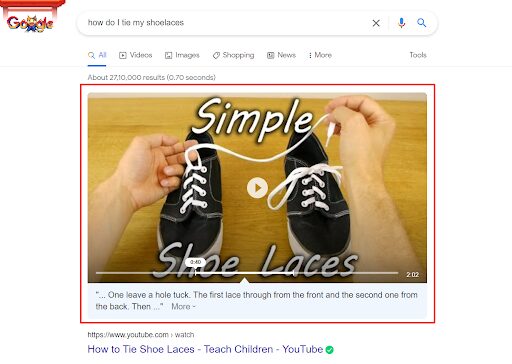
The bottom line is that videos are a big asset to optimize for voice search queries.
So, getting your videos to the top of the search results is even more valuable and you can get a lot of attention from voice searchers.
8. Rank For ‘… Near Me’ Searches
‘Near Me’ is an important part of local voice searches.
It has taken the local searches from ‘city’ to ‘block’ to ‘street.’
People usually do voice searches with a local intent when they most desire your service or product.
So, if you are a local business, you must optimize content for nearby searches.
For example, you are in the Fenway Park area and wish to have lunch. You can turn on voice search and say, ‘restaurants near Fenway park.’
The search result will list out various food outlets near you:
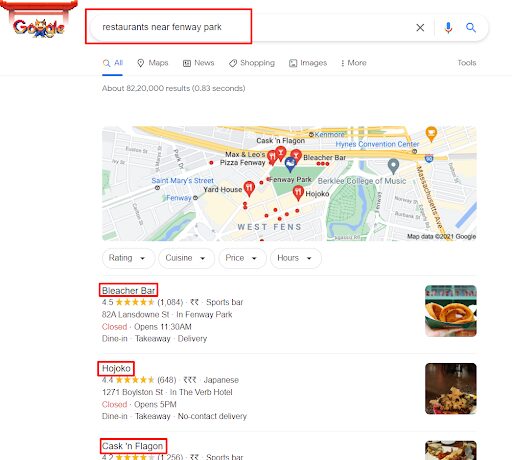
Businesses that have used ‘near Fenway’ or ‘in the Fenway area’ in their content will rank for hyper-local voice searches like this.
If you add such phrases in your content, you can get many customers walking through the door.
9. Improve Your Site Speed
Loading speed might be a key ranking signal for voice queries.
When you ask Google Home or Alexa a question, you won’t like standing there and waiting for an answer. You’d want a reply ASAP.
Therefore, if you want to optimize your content for voice search queries, make sure your site loads as quickly as possible.
You can check your page speed using Google’s Page Speed Insights tool. It will help you find out what you need to fix.
If you have a fast-loading website with valuable content, you can further increase your chances of ranking for voice searches.
10. Build Your Domain’s Authority
Sites with lots of backlinks rank higher in voice searches.
This is mainly because most voice search results (on voice-enabled devices) are single answers.
Search engines want to be confident in the information they are providing so they look to trusted sources.
Backlinks help show that content is authentic and accurate. And they prioritize the domain’s authority over the page’s while doing so.
For example, you do a voice search, ‘what food should we eat during fast.’
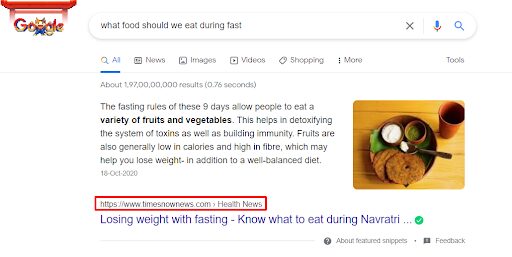
The answer comes from an authoritative domain (DR = 80). The average DR of a voice search result is nearly 76.8. (That’s quite high.)
You can improve your site’s domain rating by building more high-quality backlinks to your site.
Here’s a Free Backlink Checker Tool to help you conduct a detailed backlink analysis of your site and your competitors.
When you build relevant backlinks to your site, search engines will use your site as a source. And you might rank for more voice search queries.
Voice Search Is Changing SEO
If you’ve used Siri, Alexa, Cortana, or Google Assistant yourself, you might have had fun with them. But, there’s a lot more to voice search than this.
More and more people are using voice-enabled devices and so, voice search is going to penetrate more in our lives.
You must understand how users interact with this technology if you want your content to rank for voice searches.
When you do, you are ready to make the most out of this big opportunity.
Did any of the tips mentioned above help you in ranking for voice search queries? Do let me know if you have any questions. I’d love to answer them.
Author Bio:
Sahil is the CEO and Founder of Rankwatch – a platform, which helps companies and brands stay ahead with their SEO efforts in the ever growing internet landscape. Sahil likes making creative products that can help in automation of mundane tasks and he can spend endless nights implementing new technologies and ideas. You can connect with him and the Rankwatch team on Facebook or Twitter.


Leave a Reply